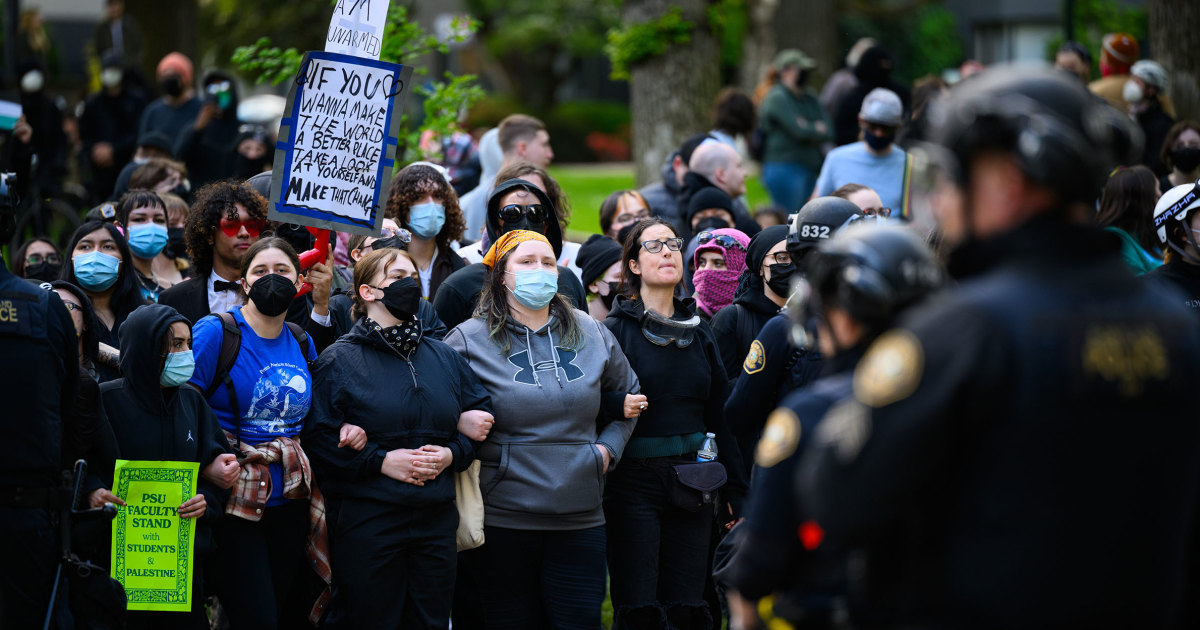Pro-Palestinian activists who set up a sprawling outdoor encampment on Columbia University’s campus divided themselves into two groups to stay organized.
In one group were protesters who were willing to be on the front lines of a possible confrontation with law enforcement. They were ready to be arrested imminently. In another group were protesters who stood ready to help their fellow demonstrators — but wanted to avoid arrest and potential charges.
In interviews with NBC News and videos recorded at the pro-Palestinian encampment in April, activists explained how elements of the protest were organized, providing a window into a tense standoff that divided the Columbia community and seized national attention.
In an interview last week, an undergraduate student from Bangladesh who spoke on the condition of anonymity because he was concerned he could lose his visa explained that he was part of the so-called “yellow” group — a squad of protesters who wanted to avoid being handcuffed and taken away by police, but nonetheless tried to bolster the activist campaign in other ways.
“When you’re yellow, essentially, you are not prepared to be arrested,” the student said. “But you are willing to provide all sorts of other support … [such as] locating picketing, making supply runs into and beyond the encampment.” He described these as “challenging tasks” that would also “not actually have … legal repercussions.”
Another Columbia undergraduate who provided only her initials because she is an undocumented immigrant and fears deportation, said last week she spent hours a day in the encampment before university officials threatened to suspend those students.
She joined a supplies “platoon” — a subgroup formed by pro-Palestinian campus organizers. She said some of those platoons volunteered to be first in line for arrest or agreed to be configured in human chains when police officers arrived.
In a video recorded late April 23, an unidentified protest organizer in a green hoodie and black mask explained that the other team — the “red” group — would be made up of people “who prefer to be arrested today, or imminently.” The crowd surrounding the organizer can be heard cheering during his speech — and a police helicopter can be heard circling overhead.
In a dramatic escalation early April 30, a group of the protesters stormed Hamilton Hall, shattering windows and barricading doors.
The protesters who occupied Hamilton Hall hung pro-Palestinian banners over the facade and set up a rope system that they used to transport supplies into the building. They renamed the building Hind’s Hall in honor of a 6-year-old Palestinian girl who was killed in the Gaza Strip.
In the end, 112 people were arrested Tuesday on the Columbia campus in upper Manhattan. New York City officials announced Thursday that 29% of those people were not affiliated with the Ivy League institution, where activist anger over Israel’s war in Gaza helped spur a campus protest movement that swept across the country in the latter half of April.
The pro-Palestinian protesters at Columbia demanded that the school divest from corporations that could be profiting from Israel’s war in Gaza, which has killed more than 33,000 people, according to local health authorities. The surprise Hamas terror attack in Israel on Oct. 7 killed more than 1,200 people, and the militants also kidnapped dozens of civilians.
